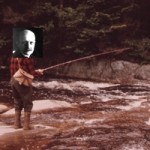
“You’re not a religious man?”
It’s a question of mild incredulity followed by a statement of the fact that makes the man’s claim to strict secularism so dubious.
“But you’re a fisherman.”
A bit from the film Salmon Fishing in the Yemen, which turns out to be a tract, wrapped in a Harlequin romance, wrapped in a sheet. But not a bad movie, for all that. Ewan McGregor is a really fun guy.
In any case, the film starts to say something profound about the overlap of religion and fishing—something much more complex than a dippy sermon on communing with nature. In response to the scientist’s objection that he concerns himself with “facts and figures”, rather than with religious matters, the sheikh asks, “How many hours do you fish…? Is that a good use of your time?”
Before the sheikh arrives at a trite conclusion about being rewarded (with a fish), he dwells on the labor of fishing, the ridiculous hours a fisherman might spend standing in a cold river for no good—by which he means “practical”—reason. Considering all the hours involved, even if the reward does come in the end, a stupid fish seems hardly commensurate.
On Max Planck’s sixtieth birthday, Albert Einstein acted the sheikh. Einstein commented on Planck’s “inexhaustible patience” in the pursuit of reconciling electrodynamics and quantum theory, especially to assert that the folks who attributed this inexhaustibility to “will-power and discipline” were wrong.
No, said Einstein, Planck’s doggedness is not merely stubbornness. “The state of mind which enables a man to do work of this kind,” Einstein averred to honor the guest of the party, “is akin to that of the religious worshiper or the lover.”
Science, went Einstein, pontificating grandly, is a temple with many mansions. Most occupants of the temple are after power and after discovering the utility that grants them prestige and privilege over everyone else. But there are some in the science temple, still, said Einstein—”odd, uncommunicative, solitary fellows”—who have come to the temple to make the cosmos the “pivot” of life.
The deep, demanding, excruciating labor of that endeavor serves no practical end, or, in Einstein’s sermon, at least, does not concern itself with some purpose. Instead, the shaman of science that Einstein rather endearingly shapes as a figure of his friend Planck, stands in the cold river in loving devotion to the thing itself, to the river, to the standing, to the sweep of the rod, to the long, silent wait, to the fish, too, and to the great, grievous problem that intervenes between fish and humanity.
If science, so religion, too. We can give Einstein the nod for knowing science—from practice and experience—so well as to characterize science’s qualities as sacred, even while we acknowledge that most of what passes for science these days is a capitalist enterprise working feverishly to turn out a chipotle-flavored superconductor.
And perhaps we can similarly appreciate the flip-side of Einstein’s metaphor. Even while we know very well that most of what passes for religion these days is a selfish enterprise, working ravenously to steal, to exploit, and to oppress by turning out chipotle-flavored dogma, perhaps we can sense, anyway, that even religion might have its sacred qualities.
Sometimes, and in many different circumstances that may all turn out to be religious, after all, we come across fishermen and fisherwomen, people who undertake the excruciating labor of waiting on the world for worship and love.











